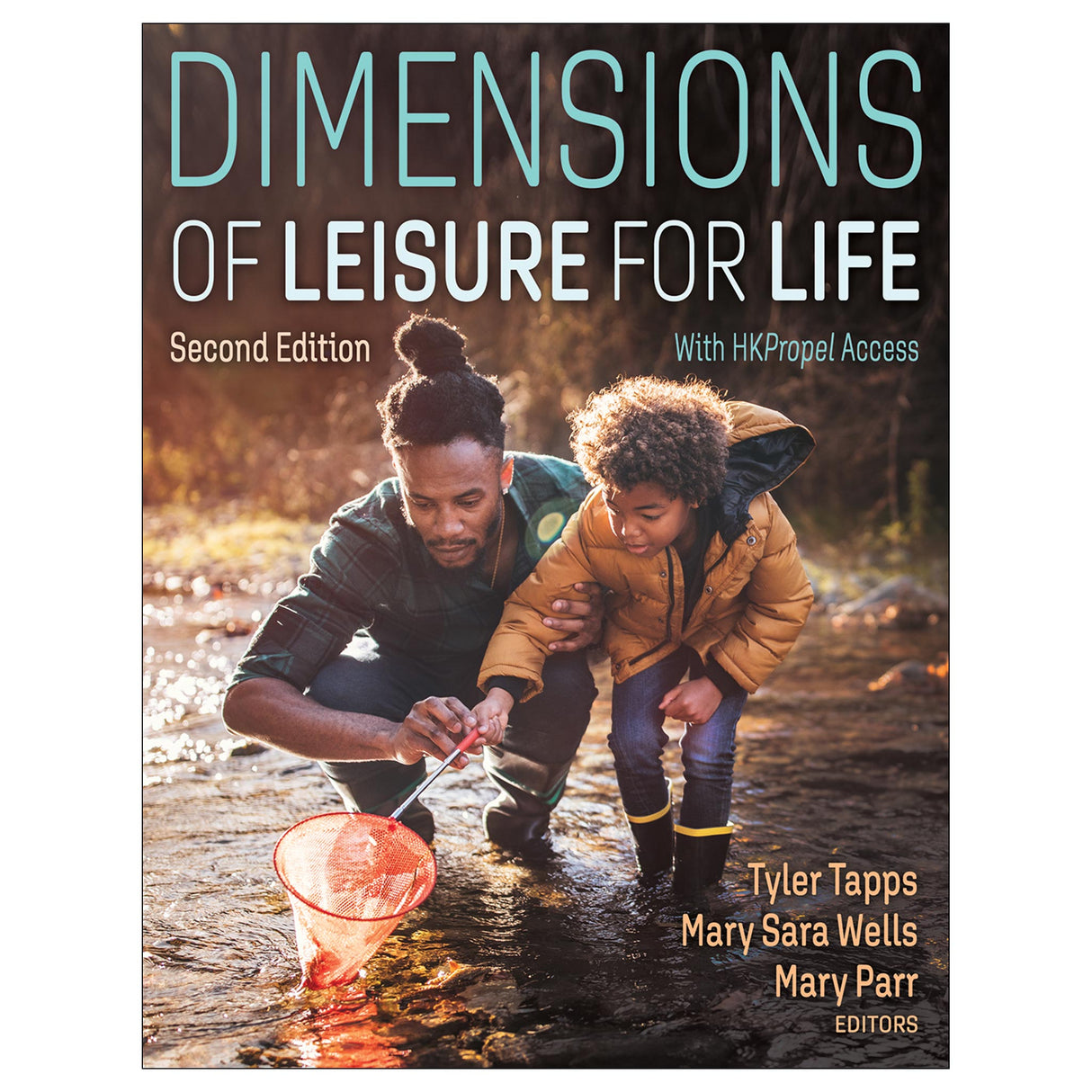Dimensions of Leisure for Life 2nd Edition Ebook With HKPropel Access
Author: Tyler Tapps, Mary Sara Wells, Mary Parr
$114.95 CAD

Part I of Dimensions of Leisure for Life, Second Edition, examines the broad dimensions of leisure and its related industries. It looks at leisure as a social science and analyzes its societal value. Part II discusses how individual dimensions of leisure affect a person’s quality of life, physical and mental health, and level of physical activity. Part III details how recreation history informs contemporary leisure studies. It uncovers the intersection of leisure and society, family life, technology, natural resources, economics, and public policy. Part IV presents the study of leisure from a consumer perspective. Awareness of local options as well as age, gender, sexual orientation, race, ethnicity, religion, and socioeconomic status; geographic distribution of leisure spaces; and stage of development all affect an individual’s participation in and level of involvement in leisure activities.
Throughout the text, students will consider the role that recreation and leisure play in their own lives. They are encouraged to seek out the resources that are available to them, learn to recognize and challenge the obstacles to participation, and commit to a leisure plan that will enhance personal growth. The book’s full-color design contains photographs and illustrations that enhance student engagement. Learning outcomes and review questions in each chapter help students set learning goals and retain key information. Vocabulary terms allow students to identify important content.
Dimensions of Leisure for Life, Second Edition, has been updated with current research and applications within the field. The second edition features the following enhancements to help students connect theoretical concepts to practical applications they can use in their future careers:
- On the Job sidebars in each chapter help students better understand common issues in the recreation and leisure workforce.
- Self-Exploration sidebars throughout the chapters provide opportunities for students to reflect on the role of leisure in their lives.
- A new chapter on leisure and family life discusses the impact of leisure on family structures and how to create valuable leisure experiences for all family members.
- The chapter on technology has been updated to reflect the digital advancements in leisure and their effect on individual equality and privacy.
- New interactive activities delivered online through HKPropel include chapter overviews, research assignments, key term flash cards, and chapter quizzes that can be automatically graded to assess student comprehension.
Note: A code for accessing HKPropel is included with this ebook.
Audience
Textbook for undergraduate courses in recreation that meet general education requirements; also a text for introductory courses for recreation majors or those considering the discipline as a major.Chapter 1. Importance of Leisure to Individuals and Society
Descriptions and Definitions
Importance of Leisure and Recreation for Individuals and Society
Value of a Leisure Ethic
Areas of the Leisure Industry
Summary
Learning Activities
Review Questions
Chapter 2. Leisure Through a Social Science Lens
We Are All Social Scientists
Benefits of Social Science
Social Science Perspectives
Connecting the Social Sciences to Leisure
Summary
Learning Activities
Review Questions
Part II: Leisure as Part of Your Lifestyle
Chapter 3. Leisure and Quality of Life
What Is Quality of Life?
The Connection Between Leisure and Quality of Life
Strategies for Enhancing Quality of Life Through Leisure
Summary
Learning Activities
Review Questions
Chapter 4. Leisure, Health, and Physical Activity
Physical Activity Trends
What Is Health?
Park and Recreation: Making a Difference
Leisure and Life Stress
Promoting Lifelong Physical Health Through Recreation and Leisure
Examining Factors That Influence Behavior
Strategies and Examples of Enhancing Physical Health Through Leisure
Summary
Learning Activities
Review Questions
Chapter 5. Leisure and Well-Being
Understanding Well-Being and Mental Health
Stress and Well-Being: The Important Role of Coping
Managing Stress to Enhance Well-Being
Participating in Meaningful Leisure to Enhance Well-Being
Determinants of Happiness
Leisure Choices That Undermine Well-Being
Strategies for Enhancing Mental Health and Well-Being Through Leisure
Summary
Learning Activities
Review Questions
Part III: Dimensions of Leisure in Society
Chapter 6. Leisure History and Heritage
Understanding Leisure From a Historical Perspective
The Primacy of Leisure
Importance of Fire and Its Effect on the Division of Labor
Agricultural Alternatives
Rise of Civilization
Leisure in the Land of the Pharaohs
Emergence of Greece
Caput Mundi: The Glory of Rome
Medieval Period: Castles, Churches, and the Peasant Culture
Renaissance: A Resurgence of Classical Values
Industrial Revolution
Origins and Development of Recreational Services in the United States
Heritage of the National Recreation and Park Association
Leisure, Recreation, and Quality of Life
Summary
Learning Activity
Review Questions
Chapter 7. Contemporary Leisure
Generations
Ways of Seeing, Ways of Knowing
Defining Popular and Culture: Historical and Sociological Views
Summary
Learning Activities
Review Questions
Chapter 8. Leisure and Family Life
Families in Society
Family Functions That Support Health and Well-Being in Society
Who Are Families?
Using Leisure to Increase Families’ Health
Creating Maintenance and Growth Connection Experiences in Family Leisure
Summary
Learning Activities
Review Questions
Chapter 9. An Introduction to Digital Leisure
The Role of Digital Technologies in Our Leisure Time
The Role of Digital Technologies in Shaping Identity
The Creepiness of Digital Technologies on Our Bodies
The Impact of Digital Technologies on Our Social Lives
Equitability of Digital Leisure Spaces
Big Brother Watching During Our Leisure Time
Summary
Learning Activities
Review Questions
Chapter 10. Leisure, Natural Landscapes, and Sustainability
Changing Landscapes in North America
Managerial Challenges
Moving Toward a Sustainable Future
Moving Beyond Islands of Hope
Summary
Learning Activities
Review Questions
Chapter 11. Leisure Economics
Leisure Economics: An Illustration
Economic Foundations
Leisure Economics and Its Importance
Economic Impact Within the Predominant Leisure Service Delivery Models
Leisure Trends: Economic Implications
Summary
Learning Activities
Review Questions
Chapter 12. Leisure, Politics, and Public Policy
Governmental Role in Leisure
Federalism
Pluralism and Public Policy
Justification for Public Recreation and Leisure
Summary
Learning Activities
Review Questions
Part IV: Leisure in Your World
Chapter 13. Campus and Community
What Is a Microcosm?
Explore Your Campus and Campus Recreation
Discover Opportunities: Components of Campus Recreation
Technology and Campus Recreation
Have a Voice and Get Involved: Volunteer and Job Opportunities on Campus
Explore Your Community
Discover Opportunities in Community Recreation
Summary
Learning Activities
Review Questions
Chapter 14. Leisure for All
People With Disabilities
Older Adults
Sports
Location and Income
Leisure and Segments of Society
Summary
Learning Activities
Review Questions
Chapter 15. Leisure and Geography
Spatial Distribution of Leisure Places
Development of Leisure Places
Leisure Travel and Transportation
Impacts of Leisure on Places
Positive Impacts of Leisure Development
Negative Impacts of Leisure Development
Climate Change and Leisure
Summary
Learning Activities
Review Questions
Chapter 16. Leisure Across the Life Span
Life Span Concepts
Introduction to Developmental Theory
Developmental Aspects and Leisure Participation Across the Life Span
Summary
Learning Activities
Review Questions
Chapter 17. Charting Your Course
Whose Life Is This, Anyway?
Changing Obstacles Into Opportunities
Finding Resources
Form an Action Plan
Monitor, Evaluate, and Modify Your Leisure Experience
Summary
Learning Activities
Review Questions
Mary Sara Wells, PhD, is an associate professor in the department of parks, recreation, and tourism at the University of Utah, where she serves as the director of undergraduate studies. She teaches courses in youth development, community recreation, and sport management and has been a member of The Academy of Leisure Sciences (TALS), the National Recreation and Park Association (NRPA), and Society of Park and Recreation Educators (SPRE) since 2004. Wells has researched issues of sporting conduct in youth sport. She has published her research in numerous journals, presented at several national and international conferences, and conducted trainings and evaluations for multiple municipal youth sport agencies across the country.
Mary Parr, PhD, is a professor of recreation, park, and tourism management at Kent State University. She has received meritorious awards in teaching and service and in research and scholarly activity. Since 1987, Parr has been a member of the National Recreation and Park Association (NRPA), where she served as chair of the Education Network (2017-2021). For over 25 years she was a member of the Society of Park and Recreation Educators (SPRE), where she served as a board member from 2007 to 2010. Parr is a member of The Academy of Leisure Sciences (TALS) and served as president in 2017. She also received the TALS Excellence in Teaching Award in 2017.
All ancillaries are free to adopting instructors through HKPropel.
Instructor guide. Includes chapter overviews, extended learning activities, mini case studies, and recommendations for films that facilitate discussion of the concepts in the text.
Test package. Contains more than 450 questions in true-false, fill-in-the-blank, essay and short-answer, and multiple-choice formats. The files may be downloaded for integration with a learning management system or printed as paper-based tests. Instructors may also use the questions to create their own customized quizzes or tests to assign to students directly through HKPropel. Multiple-choice and true-false questions are automatically graded, and instructors can review student scores in the platform.
Chapter quizzes. Contains ready-made quizzes to assess student comprehension of the most important concepts in each chapter. Each quiz contains 10 questions and can be assigned to students directly through HKPropel. The assessments are automatically graded, and instructors can review student scores in HKPropel.
Presentation package. Features PowerPoint slides of text, artwork, and tables from the book that can be used for class discussion and presentation. The slides in the presentation package can be used directly within PowerPoint or printed to make handouts for students. Instructors can easily add, modify, and rearrange the order of the slides.
Instructors also receive access to all student materials in HKPropel. For Dimensions of Leisure for Life, Second Edition, this includes chapter overviews, research assignments, response assignments, web links, and key term flash cards.









